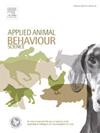More inattentive dogs benefit from repetitive but not permissive training
IF 2.2
2区 农林科学
Q1 AGRICULTURE, DAIRY & ANIMAL SCIENCE
引用次数: 0
Abstract
Dogs’ learning performance is influenced by various factors, including training style and post-learning sleep. Family dogs naturally display a large variation in their inattention and impulsivity, traits that can affect both their behaviour and learning outcomes. In this study, we conducted a complementary analysis on the dataset from Reicher et al. (2024) to investigate the effect of dogs' inattention and impulsivity on their behaviour and learning performance. We also revealed to what extent the dogs’ training level, and the owner’s strictness influence the results. Family dogs (N=25) were trained under both Permissive and Controlling conditions in a counterbalanced within-subject design. Each training session was followed by a learning performance test, a two-hour sleep session, and a post-sleep retest. Owner-rated inattention and impulsivity scores were retained from a validated questionnaire (DAFRS). More impulsive dogs tended to learn slightly faster, regardless of the training condition. Dogs with higher inattention scores performed better during the pre-sleep test on the second training occasion (regardless of the condition) and in the post-sleep retest under the Controlling condition. In the Permissive condition, less inattentive dogs showed greater performance improvement from pre- to post-sleep. Furthermore, dogs with stricter owners performed better in the retest, regardless of the training condition, while the dogs’ training level did not affect their performance. Our results revealed complex interactions between training style, training order, sleep, and dogs’ impulsivity and inattention. Some advantages of more impulsive and inattentive dogs may be less surprising considering our typical dog sample, not including individuals with extremely high inattention or impulsivity scores. Although dogs performed better on the first training occasion (Reicher et al., 2024), more inattentive dogs seemed to be less affected by proactive interference (prior learned information impeding subsequent learning within a similar context) on the second session, and they appeared to benefit from a Controlling training style and the repetitive nature of the training procedure. These findings suggest that the effectiveness of different training styles depends on individual dog traits, such as inattentiveness.
注意力不集中的狗可以从重复性而非放任性的训练中获益
狗狗的学习成绩受多种因素的影响,包括训练方式和学习后的睡眠。家犬在注意力不集中和冲动方面自然会表现出很大的差异,这些特征会影响它们的行为和学习效果。在本研究中,我们对 Reicher 等人(2024 年)的数据集进行了补充分析,以研究狗的注意力不集中和冲动对其行为和学习成绩的影响。我们还揭示了狗的训练水平和主人的严格程度对结果的影响程度。我们对家犬(25 只)进行了 "放任 "和 "控制 "两种条件下的训练,并在受试者内部进行了平衡设计。每次训练后都会进行学习成绩测试、两小时睡眠测试和睡眠后复测。狗主人评定的注意力不集中和冲动性得分均来自一份有效的问卷(DAFRS)。无论训练条件如何,冲动型犬的学习速度往往略快。注意力不集中得分较高的狗狗在第二次训练的睡前测试(无论训练条件如何)和控制条件下的睡后复测中表现较好。在 "放任 "条件下,注意力不集中程度较低的狗从睡前到睡后的表现都有较大提高。此外,无论训练条件如何,主人要求较严格的犬在复测中表现较好,而犬的训练水平并不影响其表现。我们的研究结果揭示了训练方式、训练顺序、睡眠与狗的冲动性和注意力不集中之间复杂的相互作用。考虑到我们的典型犬只样本中不包括注意力不集中或冲动性得分极高的个体,冲动性和注意力不集中的犬只的一些优势可能并不那么令人惊讶。虽然狗在第一次训练中表现较好(Reicher 等人,2024 年),但注意力不集中的狗在第二次训练中受主动干扰(先前学习的信息在类似情境中阻碍后续学习)的影响似乎较小,它们似乎从控制型训练风格和训练过程的重复性中获益。这些研究结果表明,不同训练方式的有效性取决于狗的个体特征,如注意力不集中。
本文章由计算机程序翻译,如有差异,请以英文原文为准。
求助全文
约1分钟内获得全文
求助全文
来源期刊

Applied Animal Behaviour Science
农林科学-行为科学
CiteScore
4.40
自引率
21.70%
发文量
191
审稿时长
18.1 weeks
期刊介绍:
This journal publishes relevant information on the behaviour of domesticated and utilized animals.
Topics covered include:
-Behaviour of farm, zoo and laboratory animals in relation to animal management and welfare
-Behaviour of companion animals in relation to behavioural problems, for example, in relation to the training of dogs for different purposes, in relation to behavioural problems
-Studies of the behaviour of wild animals when these studies are relevant from an applied perspective, for example in relation to wildlife management, pest management or nature conservation
-Methodological studies within relevant fields
The principal subjects are farm, companion and laboratory animals, including, of course, poultry. The journal also deals with the following animal subjects:
-Those involved in any farming system, e.g. deer, rabbits and fur-bearing animals
-Those in ANY form of confinement, e.g. zoos, safari parks and other forms of display
-Feral animals, and any animal species which impinge on farming operations, e.g. as causes of loss or damage
-Species used for hunting, recreation etc. may also be considered as acceptable subjects in some instances
-Laboratory animals, if the material relates to their behavioural requirements
 求助内容:
求助内容: 应助结果提醒方式:
应助结果提醒方式:


